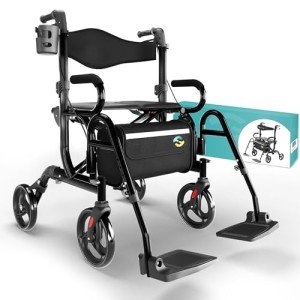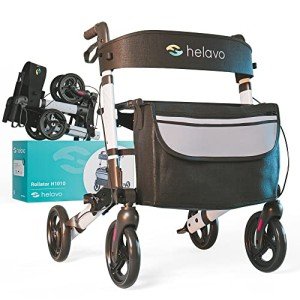You'll Never Guess This Rollator For Seniors's Benefits
페이지 정보

본문
Understanding Rollators for Seniors: A Comprehensive Guide
As people age, preserving mobility and independence ends up being progressively crucial. One tool that has changed senior mobility is the rollator. More than simply a walking aid, rollators offer stability, support, and even a place to rest, permitting seniors to browse their environments with self-confidence. In this detailed guide, we will examine what a rollator is, its benefits, types, features, and important considerations for purchase. Moreover, we will attend to some regularly asked concerns to help readers make informed decisions.
What is a Rollator?
A rollator is a kind of wheeled walker equipped with 3 or four wheels, hand brakes, and a seat. Unlike basic walkers, which require the user to lift them with each step, rollators allow users to push the All-Terrain Walker while walking, supplying more support and stability. They are particularly designed for individuals who may have balance issues and require assistance navigating without sacrificing independence.
Benefits of Using a Rollator
The benefits of using a rollator for seniors are many. Here are some essential advantages:
- Enhanced Mobility: Rollators allow seniors to stroll more with confidence and conveniently without the requirement to completely count on others for support.
- Convenience: With built-in seats, users can take a break whenever they need to, thereby minimizing tiredness throughout trips or errands.
- Security Features: Many rollators come with handbrakes that allow users to stop and secure the walker in place, lowering the risk of falls.
- Storage Options: Some rollators come geared up with storage compartments or baskets, making it much easier to carry individual products like purses, groceries, or Medical Walker products.
Kinds of Rollators
Rollators can be found in different models customized to various needs and choices. Here's a breakdown of the most common types:
| Type of Rollator | Description | Perfect for |
|---|---|---|
| Requirement Rollator | Generally features 4 wheels and a comfortable seat for resting. | Many seniors requiring basic support. |
| Indoor Rollator | Developed for usage inside the home, with slimmer frames for maneuverability. | Seniors requiring to browse tight areas. |
| Heavy-Duty Rollator | Constructed with a more powerful frame to support greater weight capacities. | Larger individuals who require durable support. |
| Lightweight Rollator Walker | Made from lightweight products for easy transport and handling. | Seniors who travel frequently or require to lift the rollator. |
| Rollator with Seat | Features a seat incorporated into the frame, supplying a resting choice. | Seniors who may tire easily or delight in longer strolls. |
| Three-Wheel Rollator | Offers maneuverability and is designed for tight areas. | Seniors needing to browse small locations. |
| Rollators with Accessories | Geared up with trays, baskets, or umbrellas for added convenience. | Seniors looking for extra performance. |
Features to Consider When Buying a Rollator
When selecting a rollator, different features can enhance the experience for seniors. Here's a list of necessary features and factors to consider:
Weight Capacity
- Make sure the rollator can support the user's weight comfortably.
Seat Height
- The seat ought to be at a comfortable height for the user, enabling easy access.
Manage Height Adjustability
- Look for rollators with adjustable handles so that users can discover their ideal height.
Brakes
- Hand brakes must be easy to engage and disengage, and they need to lock firmly.
Wheels

- Larger wheels can handle irregular outdoor surface areas much better than smaller sized ones.
Frame Material
- Lightweight frames are easier to maneuver, especially for seniors with reduced strength.
Portability

- Foldable rollators are much easier to keep or transport in a vehicle.
Storage Options
- Try to find baskets or trays for carrying products, improving practicality throughout getaways.
Devices
- Some rollators come with included accessories like bags, cup holders, or perhaps a flashlight, which can boost functionality.
Style and Color
- Aesthetic preference is likewise important; picking a rollator that interest the user can make a big distinction in motivating regular use.
Often Asked Questions (FAQ)
Q1: Who should use a rollator?
- Rollators are ideal for individuals who have problem walking due to age, injury, or medical conditions such as arthritis or post-surgery healing.
Q2: How much do rollators usually cost?
- Costs for rollators can vary extensively, from around ₤ 70 to over ₤ 300, depending upon features, materials, and brand name.
Q3: Can rollators be utilized outdoors?
- Yes, many rollators are created for both indoor and outdoor use. Look for models with larger wheels for outdoor navigation.
Q4: Are rollators adjustable?
- The majority of rollators have adjustable manages and seat heights to accommodate different user sizes and preferences.
Q5: Do I need a prescription to buy a rollator?
- Typically, a prescription is not required to buy a rollator. Nevertheless, talking to a doctor can provide personalized suggestions.
Utilizing a rollator can significantly improve the quality of life for seniors, improving their mobility while promoting self-reliance. When selecting the right rollator, think about aspects such as weight capacity, height adjustability, and additional features to find the best match. With the ideal rollator, seniors can enjoy greater liberty, self-confidence, and convenience in their everyday lives. Whether for a walk in the park or running errands, a rollator could effectively be the key to maintaining an active way of life as one ages.
- 이전글How Car Locksmiths In Hertfordshire Became The Hottest Trend In 2024 25.09.18
- 다음글Why Diverse Groups Create Exciting Dynamics 25.09.18
댓글목록
등록된 댓글이 없습니다.
